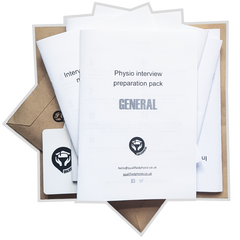This is an excerpt from our Band 5 / Graduate MSK Physio interview prep resource, available as a standalone pack or part of our Band 5 Bundle.
An 18 year old active runner comes to you with bilateral anterior shin pain. Tell us what you would include in your subjective assessment.
🤫 Interviewer tip:
Avoid the temptation to jump straight to the ‘obvious answer’ – reaching a diagnosis of shin splints when someone complains of anterior shin pain isn’t rocket science, but as a healthcare professional it is your job to ensure that you have ruled out other possible causes, and you need to ensure you demonstrate your clinical reasoning clearly. In this case, the 18 year old could have cancer, fractures, an infection or a serious compressive neurological or vascular condition. There also isn’t a lot of information provided, so it is up to you to design your answer. The panel cannot provide you with more information than they have given so there is no point answering follow up questions such as ‘did they have an x-ray’. You create the case, and build on the scenario.
You can take different approaches:
When considering questions related to subjective assessment it is useful to go back to University and consider the bread and butter approach to subjective questioning. If you can memorise the initial assessment sheet questions from start to finish you will be able to demonstrate a nice flow through your clinical reasoning. There are several mnemonics you can use, such as SOCRATES:
Site – where is it, can you point to it etc.
Onset – when did it start, was it acute or intermittent, what were you doing?
Character – describe the pain, sharp, aching, stabbing, dull etc.
Radiation – any referred pain?
Associated features – any other symptoms or problems, pins and needles, numbness, red flags can also fall in under here.
Time (24 pattern) – how does it behave during the day and is it getting better, worse or staying the same.
Exacerbating of alleviating factors – what makes it better or worse
Severity – how bad is it, VAS 0-10 or some other metric to measure pain severity.
SOCRATES is a useful mnemonic for pain history but is insufficient for the entire subjective history. You can also take a more medical specific approach based on the initial assessment form often used in outpatient departments:
Present condition (PC) – why are you here and what are you presenting with today?
History of present condition (HPC)– what was it like before, what was the mechanism of injury?. SOCRATES can be used here.
Past medical history (PMH) – information about their medical history, don’t forget mental health, depression and anxiety – this is a big predictor of rehab potential. However a simple biomedical mnemonic is JAM THREADS: Jaundice, Anaemia/blood disorders, Myocardial Infarction, Tuberculosis/Thyroid, Hypertension/heart disease, rheumatism, Epilepsy, Asthma & COPD, Diabetes, Stroke.
Drug history (DH) - what medication and what dosage. Useful to ask about allergies too.
Social history (SH) - smoking, alcohol, work, hobbies, live alone, with family, dependents / caring for anyone,
Aggs / eases: unless using SOCRATES above during PMH section, you would ask aggs / ease here.
24 hr pattern: how it behaves am / pm, getting better, worse or staying the same.
Sleep: this is often forgotten but has a huge impact on health and recovery.
Seen anyone else for this problem? Did that help?
You are allowed to make assumptions during the interview, you create your own answer – make the patient real and create the optimal scenario for you – if they don’t agree with your assumption the panel will stop and suggest a different version. In this instance, they could for example say: ‘what if he had a history of cancer’, or ‘what if he recently had surgery on his knees’. You never know what they will get up to but in our experience they are unlikely to interrupt with a different suggestion.
________________
Be aware that this is only a single example of a question and its suggested answer, and depending on the type of job, the place of work, or even the interview panel members, you might need to adapt and/or provide other elements in your answer.
If you'd like to know more, see other questions and answers, and even have a go at practising them, you can grab our interview preparation packs or book on one of our one-to-one sessions.
Related products:
MSK interview preparation pack
Our MSK pack designed for newly-graduated physios or physios applying for band 5 / junior positions includes interview questions and answers, key articles and references and top tips for the job, amongst others.
6 interview preparation packs, for less.
Senior / Band 6 MSK interview pack
The same concept as our interview preparation packs for newly-graduates, just specific to senior MSK interviews.







